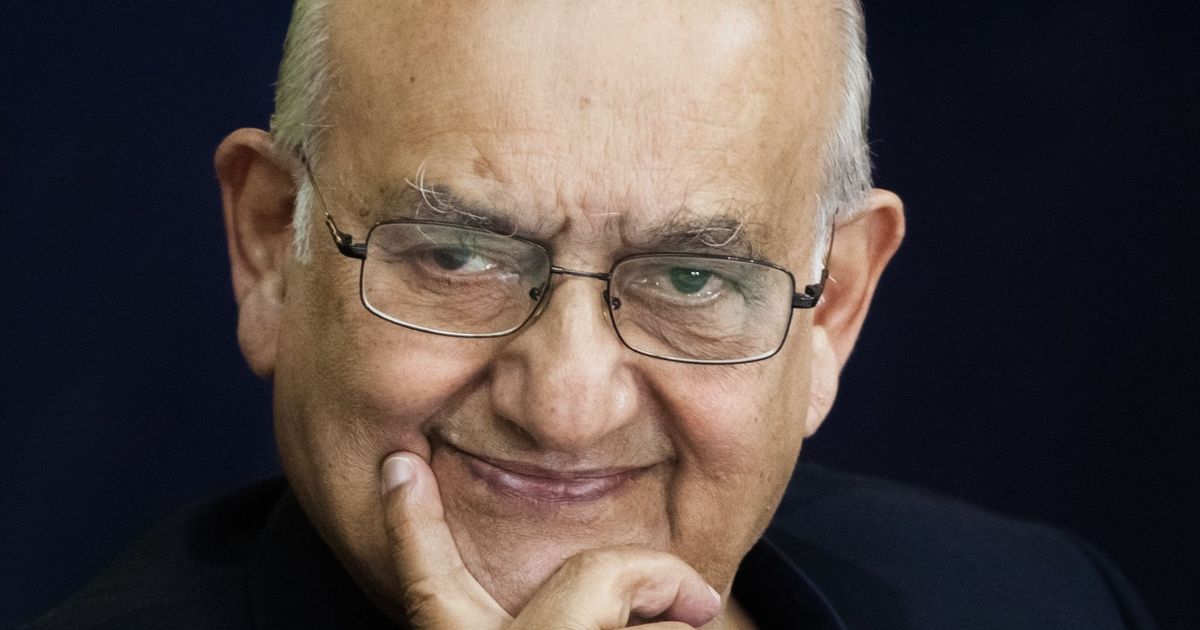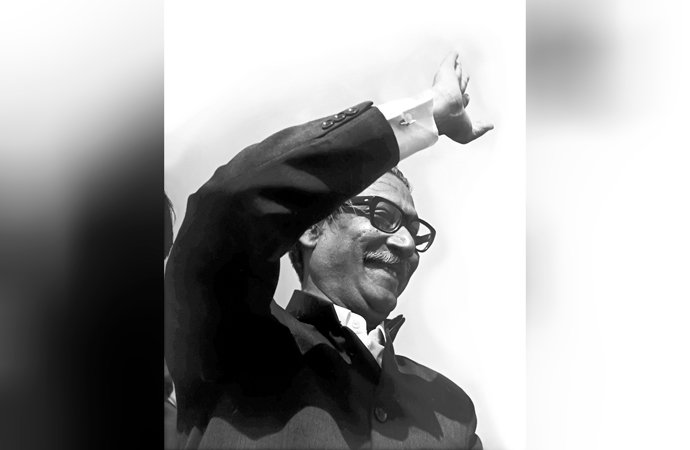Published in Dhaka Tribune on Wednesday, 15 August 2018

Renowned economist and freedom fighter Professor Rehman Sobhan speaks to Shuprova Tasneem on his recollections of Bangabandhu and how he shaped Bangladesh
In 1970, you wrote about the ‘Mujib phenomenon’, and how his supporters were not just college students and Bengali bourgeoisie but factory workers, day labourers and rickshaw pullers. As a witness to the events that unfolded, how do you think Mujib captured the hearts of a nation?

By the time the 1970 election got underway, Bangabandhu was seen by all Bangladeshis as a leader apart from all others. But it was the election campaign itself which gave him access to all classes of people. The nation had been under Martial Law since 1958. The subsequent Ayub constitution limited access for political leaders to mass audiences since the parliament was elected indirectly through the votes of 80,000 locally elected Basic Democrats. A people oriented leader such as Bangabandhu was thus cut off from mass contact for the previous 12 years prior to the 1970 election. These elections of 1970 provided all political parties the first opportunity in 12 years to reach out to the common people rather than smaller urban audiences.
No leader made better use of this opportunity than Bangabandhu. Apart from Maulana Bhashani, no other Bengali leader had the capacity or language to reach out to the mass of peasants and workers. Bangabandhu appreciated that it was this mass based constituency which would not only overwhelmingly deliver the vote for six points but would also have the courage and strength to face the military if they reneged from their commitments to return power to the elected representatives. Bangabandhu therefore specially directed his appeal to this class and advised us to prepare the Awami League (AL) 1970 manifesto in such a way as would respond to the concerns of the common people.
When did you first meet Bangabandhu? Was there a specific point or turn of events where you think he began to be set apart as the leader of East Bengal?
I have already written in my memoir about my first encounters with Bangabandhu in the summer of 1957 shortly after my arrival in Dhaka from Cambridge. I first met him at the residence of my grand uncle Khawja Nazimuddin at a magnificent dinner he had hosted specially for Ataur Rahman Khan, then Chief Minister of the AL led government of East Pakistan and Bangabandhu who was Minister for Commerce, Labour and Industries and also General Secretary of the Provincial AL.
I again met Bangabandhu a few months later at the bedside of Mian Iftikharuddin, a left oriented leader from Panjab, who was in Dhaka to attend the foundational meeting of the Maulana Bhashani led National Awami Party (NAP). Iftikharuddin had been attacked and injured by some hoodlums, en route to attending the NAP meeting and was recuperating in his hotel room. I had called on him as his son, Arif Iftikhar, had been one of my close friends at Cambridge. When I was there Bangabandhu also came in to greet Mian Iftikharuddin as an act of courtesy even though the AL strongly opposed the founding of the NAP.
On both occasions that I initially met Bangabandhu, he demonstrated his courtesy and generosity towards two political opponents of quite contrary political views. He was naturally surprised to meet me twice within a short period in such diverse political company. He remembered this and reminded me of our first encounter when I met him again when we were working together in shaping the AL agenda for the 1970 elections. Bangabandhu never forgot a person once he met him.
What was it like to work with Bangabandhu as your leader when you were part of the Planning Commission?
He was very receptive to ideas, always respectful and interested to learn about policy issues. When he disagreed with some of our suggestions he always explained his reasons and never sought to impose his opinions on us. Bangabandhu had a unique capacity for understanding the political implications of a policy. As a result, he ensured that no major policy decision relating to the economy, which may have significant political consequences, could be put in place without his fully understanding its implications and extending his direct approval. I learnt more from Bangabandhu about the discipline of political economy than I did from studying many academic works on the subject.
In a culture where those in power seek to build support through extending political patronage he never, in his capacity as Chairman of the Planning Commission, ever asked the Commission, which was then engaged in allocating and programming aid resources, to give special consideration to any person.
You also wrote that the assassination of Bangabandhu was not just the murder of a leader and his family, but an assault on the inspirational sources of our nationhood. Can you tell us of your recollections of these troubled times?
There was always a small political force, loyal to the idea of Pakistan, which stayed alive and concealed in the post-liberation period. They saw Bangabandhu as the primary instrument for the death of Pakistan and the creation of Bangladesh and never forgave him for that.
You have written about Bangabandhu becoming the symbol of Bengali nationalism in the late 60s and 70s. Forty years down the line, do you think we still view him this way?
I still view Bangabandhu after 40 years as the symbol of Bengali nationalism. Over the years new narratives on the sources of our nationalism have been introduced into the political discourse. While various historic forces and eminent personalities influenced our nationalism, Bangabandhu was the political catalyst who channelled these various streams into a single political force, at the right moment in history. Today if we define our nationalism through the four guiding principles underwriting our constitution – democracy, nationalism, secularism and socialism, these ideals tend to be observed largely in ritualistic forms in a society which has over the years, distanced itself in public practice from our founding values.
After the 1969-70 election campaign, you wrote that he had graduated to a ‘near mythic figure’. We can only imagine the love and respect this great man inspired back then, but now that he is gone, do you think there are dangers of focusing more on the myth than the man?
There is always a danger that epic national heroes end up as mythic figures to be revered rather than to have their ideals carried forward into the real world by successive generations. All heroes, at the end of the day, are human beings of flesh and blood and not saints. That is what makes them great leaders to whom ordinary people can relate.
Do you think there was a shift in national/political ideology after the assassination of Bangabandhu? How do you think Bangladesh’s economic/foreign policies and/or our relations with other countries were affected?
There was a clear shift in ideology and policies after 15 August 1975 and was one of the key objectives behind the assassination conspiracy. The post-Bangabandu regime moved towards a more free market oriented, inegalitarian development strategy, which all successive regimes have kept in place over the years. Our foreign policy became more pro-western, more sympathetic to Pakistan and distanced from India. In recent years, under the present regime, there has been considerable course correction so that our foreign policy remains more independent and less reliant on aid or donor policy advice.
In 2000, when writing about Bangabandhu, you said there is a ‘strong tendency to take our nationhood for granted.’ Do you think we are still doing this?
I used this concept of taking our nationhood for granted to emphasis that unlike many independence movements in contemporary history, ours was realised through prolonged political struggle culminating in a bloody war of national liberation where the price of our nationhood was paid through the lives of countless ordinary people. Such high costs have been paid by few countries and need to be recognised and accounted for by the beneficiaries of national liberation. Bangabandhu was deeply conscious of this blood debt to the people and aspired to build a more inclusive society rather than recreate the unjust, inegalitarian society which provided the basis of the Pakistan state against which he had struggled for so long. While Bangladesh has registered quite impressive levels of development in recent years which would have pleased Bangabandhu, he would have been troubled at the widening social disparities within society and the capture of our political process through the power of money and muscle. Bangabandhu prided himself on building a party from the grassroots up which would come to power through the instrument of competitive elections where the unconstrained expression of the popular will established its unchallengeable legitimacy to lead the country.

